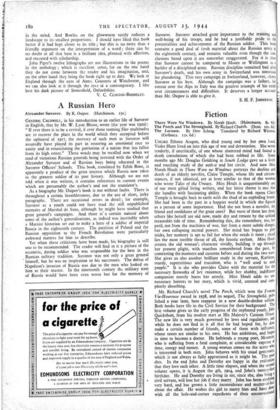A Russian Hero
Alexander Suvorov. By K. Osipov. (Hutchinson. 153.)
GENERAL CALDWELL, in his introduction to an earlier life of Suvorov in English, that by Mr. W. Lyon Blease, wrote (the year was 1920): "If ever there is to be a revival, if ever those teeming Slav multitudes are to recover the place in the world which they occupied before the upheaval of 1917, the memory of such men as Suvorov will assuredly have played its part in restoring an emotional race to sanity and in resuscitating the patriotism of a nation that has fallen from its high estate." These words may be recalled now when we read of victorious Russian generals being invested with the Order of Alexander Suvorov and of Russian boys being educated in the Suvorov Officers' Schools. This book, translated by Edith Bone, is apparently a product of the great interest which Russia now takes in the greatest soldier of its past history. Although we are not told, when it was written, it contains references to current events which are persumably the author's and not the translator's.
As a biography Mr. Osipov's book is not without faults. There is throughout a certain breathlessness, due to the use of short, jerky paragraphs. There are occasional errors in detail ; for example, Suvorov as a youth could not have read the still unpublished memoirs of Marshal de Saxe, although he might have studied that great general's campaigns. And there is' a certain naivetg about some of the author's generalisations, as indeed was inevitable when a Marxist historian set out to make a hero of a soldier of imperial Russia in the eighteenth century. The partition of Poland and the Russian opposition to the French Revolution were particularly awkward matters for him to describe. Yet when these criticisms have been made, his biography is still one to be recommended. The reader will find in it a picture of the eccentric, daring soldier who was responsible for the best in the Russian military tradition. Suvorov was not only a great general himself, but he was an inspiration to his successors. The defeat of Napoleon's invasion of Russia was due to the men who looked on him as their master. In the nineteenth century the military state of Russia would have been even worse but for the memory of
Suvorov. Suvorov attached great importance to the training alai well-being of his troops, and he had a justifiable pride in the potentialities and achievements of the Russian soldier. This boak contains a good deal of fresh material about the Russian army ia the eighteenth century, and remains valuable even though the con. elusions based upon it are somewhat exaggerated. For it is clear that Suvorov cannot be compared to Moore or Wellington as a builder of a disciplined army. Russian discipline remained bad after Suvorov's death, and his own army in Switzerland. was notorious for plundering. This very campaign in Switzerland, however, shows Suvorov at his best. 'Although the campaign was a failure, his retreat over the Alps to Italy was the greatest triumph of his mind over circumstances and difficulties. It deserves a longer account than Mr. Osipov is able to give it.
S. H. F. JOHNSTON.


























 Previous page
Previous page